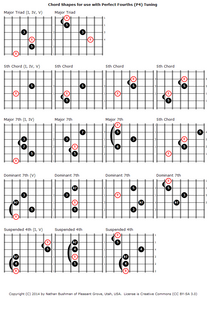All fourths tuning
| All fourths | |
|---|---|
 The consecutive open notes of all-fourths tuning are spaced apart by five semitones on the chromatic circle, which lists the twelve notes of the octave. | |
| Basic information | |
| Aliases | Perfect-fourths tuning |
| Interval | Perfect fourth |
| Semitones | 5 |
| Example(s) | E-A-D-G-C-F |
| Advanced information | |
| Other instruments | Bass guitar |
| Repetition | No |
| Advantages | Closely approximates standard tuning |
| Disadvantages | Difficult to play conventional music, especially barre chords |
| Left-handed tuning | All-fifths tuning |
| Associated musician | |
| Guitarist | Stanley Jordan Alex Hutchings Tom Quayle |
 | |
| Jazz musician Stanley Jordan stated that all-fourths tuning "simplifies the fingerboard, making it logical". | |
| Regular tunings (semitones) | |
| Trivial (0) | |
| Minor thirds (3) | |
| Major thirds (4) | |
| All fourths (5) | |
| Augmented fourths (6) | |
| New standard (7, 3) | |
| All fifths (7) | |
| Minor sixths (8) | |
| Guitar tunings | |
Among alternative tunings for the guitar, all-fourths tuning is a regular tuning.[1] In contrast, the standard tuning has one irregularity—a major third between the third and second strings—while having perfect fourths between the other successive strings.[2][3] The standard tuning's irregular major-third is replaced by a perfect fourth in all-fourths tuning, which has the open notes E2-A2-D3-G3-C4-F4.[1][4]

Among regular tunings, this all-fourths tuning best approximates the standard tuning.[5]



In all guitar tunings, the higher-octave version of a chord can be found by translating a chord by twelve frets higher along the fretboard.[6] In every regular tuning, for example in all-fourths tuning, chords and intervals can be moved also diagonally. For all-fourths tuning, all twelve major chords (in the first or open positions) are generated by two chords, the open F major chord and the D major chord. The regularity of chord-patterns reduces the number of finger positions that need to be memorized.[1] Jazz musician Stanley Jordan plays guitar in all-fourths tuning; he has stated that all-fourths tuning "simplifies the fingerboard, making it logical".[7]
Among all regular tunings, all-fourths tuning E-A-D-G-C-F is the best approximation of standard tuning, which is more popular. All-fourths tuning is traditionally used for the bass guitar;[5] it is also used for the bajo sexto.[8]
Allan Holdsworth stated that if he were to learn the guitar again he would tune it in all-fourths.[9][10]
Relation with all-fifths tuning
All-fourths tuning is closely related to all-fifths tuning. All-fourths tuning is based on the perfect fourth (five semitones), and all-fifths tuning is based on the perfect fifth (seven semitones). The perfect-fifth and perfect-fourth intervals are inversions of one another, and the chords of all-fourth and all-fifths are paired as inverted chords. Consequently, chord charts for all-fifths tunings may be used for left-handed all-fourths tuning.[11]
See also
- Scordatura, alternative tunings of stringed instruments
- Laúd and bandurria, Spanish six-course plucked string instruments tuned in fourths
- Puerto Rican cuatro, five-course plucked string instrument tuned in fourths
- commons:Category:Perfect fourths tuning charts and diagrams for P4 tuning
Notes
- ^ a b c Sethares (2001, p. 52):
Sethares, Bill (2001). "Regular tunings". Alternate tuning guide (PDF). Madison, Wisconsin: University of Wisconsin; Department of Electrical Engineering. pp. 52–67. 2010 Alternate tuning guide, including a revised chapter on regular tunings. Retrieved 19 May 2012.
- ^ Nash (1997)
- ^ Denyer (1992, pp. 158–159)
- ^ Weissman (2006, p. 68)
- ^ a b Sethares (2001, p. 58)
- ^ Sethares (2001, p. 9)
- ^
Ferguson (1986, p. 76):
Ferguson, Jim (1986). "Stanley Jordan". In Casabona, Helen; Belew, Adrian (eds.). New directions in modern guitar. Guitar Player basic library. Hal Leonard Publishing Corporation. pp. 68–76. ISBN 0881884235. - ^ "The Stringed Instrument Database: Index". stringedinstrumentdatabase.aornis.com. Retrieved 26 May 2023.
- ^ Allan Holdsworth on All-Fourths Tuning – Streamable, retrieved 16 February 2018
- ^ "The Unreachable Star (Guitar World 1989) – Allan Holdsworth Information Center". fingerprintsweb.net. Retrieved 31 May 2022.
- ^ Sethares (2001, p. 53)
References
- Denyer, Ralph (1992). "Playing the guitar". The guitar handbook. Special contributors Isaac Guillory and Alastair M. Crawford (Fully revised and updated ed.). London and Sydney: Pan Books. pp. 65–160. ISBN 0-330-32750-X.
- Nash, Paul (1 July 1997). "Guitar in fourths: Guitar tuning with all strings in perfect fourth intervals apart". Guitar Player. NewBay Media LLC. Archived from the original on 29 March 2015. Retrieved 14 October 2012 – via HighBeam Research.
- Sethares, William A. (2011). "Alternate tuning guide". Madison, Wisconsin: University of Wisconsin; Department of Electrical Engineering. 2010 PDF version by Bill Sethares. Retrieved 19 May 2012.
- Weissman, Dick (2006). "Other tunings: Fourths tuning". Guitar tunings: A comprehensive guide. Routledge. pp. 68–70. ISBN 9780415974417. LCCN 0415974410.[permanent dead link]
- Yamaguchi, Masaya (2018). All Fourths: A Method For EADGCF Tuning On Guitar. New York: Masaya Music. pp. 1–152. ISBN 978-0-9998784-0-8.
Further reading
- Bianco, Bob (1987) [1969]. Guitar in fourths: A manual for playing. New York City: Calliope Music. pp. 1–64. ISBN 0-9605912-2-2. OCLC 16526869. republication of A manual for playing the guitar in fourths (Catalona Enterprises, pp. 1–64)
- Law, Ant (2011). 3rd Millennium Guitar: An Introduction to Perfect 4th Tuning. Pacific, MO: Mel Bay Publications. pp. 1–75. ISBN 978-1610659680.
External links
- Bromley, Keith (May 2013). Sixty guitar chords for all-fourths tuning: An introductory tutorial about chords on a guitar tuned to all fourths (PDF). Retrieved 9 November 2013.
- Zhille's guitar blog: Perfect fourths (P4) tuning–Basics and examples
- Lessons and articles on fourths tuning using Eb-Ab-Db-Gb-B-E Archived 19 April 2015 at the Wayback Machine
- Introduction to All Fourths Tuning + Free PDF Reference Guide
- r/allfourthstuning sub-reddit for all fourths tuning
